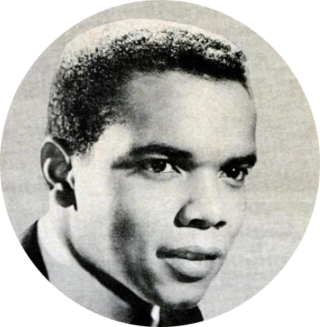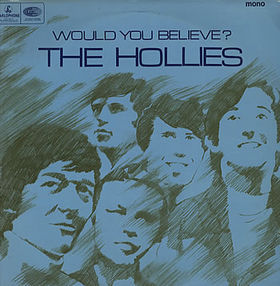I Can't Take It may refer to:
- "I Can't Take It", a 1967 song by Ernie Smith, covered in 1975 by Johnny Nash as Tears on My Pillow (Johnny Nash song)
- I Can't Take It (Cheap Trick song), 1983
- I Can't Take It (Dillon Francis song), 2014
I Can't Take It may refer to:

Leigh Anne Bingham Nash is an American singer and songwriter who is the lead vocalist for the Christian alternative rock band Sixpence None the Richer and was also a member of Fauxliage. Her debut solo album, Blue on Blue, was released in August 2006. Nash has released two other solo albums in 2011 and 2015. Nash has two Grammy nominations: "Best Pop Performance By A Duo Or Group With Vocal" in 1999 and "Best Rock Gospel Album" in 1998. In July 2023, it was announced that Nash would be joining 10,000 Maniacs as their new lead singer.

Stephen Arthur Stills is an American musician, singer, and songwriter best known for his work with Buffalo Springfield, Crosby, Stills & Nash, and Manassas. As both a solo act and member of three successful bands, Stills has combined record sales of over 35 million albums. He was ranked number 28 in Rolling Stone's 2003 list of "The 100 Greatest Guitarists of All Time" and number 47 in the 2011 list. Stills became the first person to be inducted twice on the same night into the Rock and Roll Hall of Fame. According to Neil Young, "Stephen is a genius".

John Lester Nash Jr. was an American singer, best known in the United States for his 1972 hit "I Can See Clearly Now". Primarily a reggae and pop singer, he was one of the first non-Jamaican artists to record reggae music in Kingston.

The Hollies are an English rock and pop band formed in 1962. One of the leading British groups of the 1960s and into the mid-1970s, they are known for their distinctive three-part vocal harmony style. Singer Allan Clarke and rhythm guitarist/singer Graham Nash founded the band as a Merseybeat-type group in Manchester, although some of the band members came from towns further north, in east Lancashire. Nash left the group in 1968 to co-form Crosby, Stills & Nash, though he has reunited with the Hollies on occasion. As well as Clarke and Nash other members have included lead guitarist Tony Hicks, rhythm guitarist Terry Sylvester, bassists Eric Haydock and Bernie Calvert, and drummers Don Rathbone and Bobby Elliott.

Brooks & Dunn is an American country music duo consisting of Kix Brooks and Ronnie Dunn, both of whom are vocalists and songwriters. The duo was founded in 1990 through the suggestion of songwriter and record producer Tim DuBois. Before their formation, both members were solo recording artists, having charted two solo singles apiece in the 1980s. Brooks also released an album for Capitol Records in 1989 and wrote hit singles for other artists.

John Marty Stuart is an American country and bluegrass music singer, songwriter, and musician. Active since 1968, Stuart initially toured with Lester Flatt, and then in Johnny Cash's road band before beginning work as a solo artist in the early 1980s. He is known for his combination of rockabilly, country rock, and bluegrass music influences, his frequent collaborations and cover songs, and his distinctive stage dress.
"Cocaine Blues" is a Western swing song written by Troy Junius Arnall, a reworking of the traditional song "Little Sadie." Roy Hogsed recorded a well known version of the song in 1947.

Would You Believe? is the fourth UK album by the Hollies, released in 1966.

"I Can See Clearly Now" is a song written and recorded by American singer-songwriter Johnny Nash. It was the lead single from his twelfth album, I Can See Clearly Now (1972), and achieved success in the United States and the United Kingdom when it was released in 1972, reaching number one on the US Billboard Hot 100 and Cash Box charts. It also reached number one in Canada and South Africa. The song has been covered by many artists throughout the years, including a hit version by Lee Towers that reached no. 19 in the Dutch Top 40 in 1982, and another recorded by Jimmy Cliff for the motion picture soundtrack of Cool Runnings that peaked at no. 18 on the US Billboard Hot 100 in 1993.

Secret Love is the seventh studio album by Lorrie Morgan, released in 1998. She dedicated this album to her late father, George Morgan. The album includes cover versions of pop standards. It peaked at number 36 on the Billboard Country Album chart.

MTV Unplugged is a live album by Tony Bennett that was released in 1994. Backed by the Ralph Sharon Trio, Bennett appeared on the TV show MTV Unplugged to showcase the Great American Songbook with guest appearances by Elvis Costello and k.d. lang.

Terius Adamu Ya Gesteelde-Diamant, better known by his stage name The-Dream, is an American singer-songwriter and record producer. He writes songs for artists in R&B and hip hop, often in tandem with production partner Tricky Stewart. Beginning with I Am... Sasha Fierce (2008), he has been credited on each of American singer Beyoncé's subsequent albums.

Confessions of the Mind is the tenth studio album by the Hollies. It was released in the United States as Moving Finger, with a different track sequence and the tracks "Separated" and "I Wanna Shout" replaced with the Clarke/Sylvester penned "Marigold: Gloria Swansong" saved from the previous album and "Gasoline Alley Bred". In Germany, it was released by Hansa as Move On with an alternate track sequence with "Gasoline Alley Bred" added. The UK version peaked at number 30 in the charts and the US version at number 183.

"You Can't Take the Honky Tonk Out of the Girl" is a song written by Bob DiPiero and Bart Allmand, and recorded by American country music duo Brooks & Dunn. It was released in September 2003 as the second single from their album Red Dirt Road. It reached number 3 in early 2004.

All or Nothing at All is a studio album by Billie Holiday, released in 1958 on Verve Records, catalog MGV8329. There are 12 songs on the LP taken from five different recording sessions that took place in 1956 and 1957. Holiday was backed by a "relaxed and understanding" small combo which included the trumpeter Harry "Sweets" Edison and the saxophonist Ben Webster. A 1959 New York Times article noted that Holiday's voice "had become a very limited instrument which she used with the craft and guile of an aging pitcher who can no longer pour his fast one across the plate."

"Where the Streets Have No Name (I Can't Take My Eyes Off You)" is a song by English synth-pop duo Pet Shop Boys. The song is a medley of U2's "Where the Streets Have No Name" and "Can't Take My Eyes Off You", a 1967 song by Frankie Valli, though in an arrangement informed by the 1982 disco version of the song by the Boys Town Gang rather than the original. The song accompanied "How Can You Expect to Be Taken Seriously?", the third single from their fourth studio album, Behaviour (1990), as a double A-side in the United Kingdom (both singles were released separately in the United States). Released in March 1991 by Parlophone, the song became the duo's 15th consecutive top-20 entry in the UK, peaking at number four on the UK Singles Chart.

Close To You is an album by American pop singer Johnny Mathis that was released on August 19, 1970, by Columbia Records and mostly included his recordings of hits that other artists had that year. The exceptions were the new movie theme "Pieces of Dreams" and the 1967 songs "Wave" by Antônio Carlos Jobim and "Yellow Days", which was an Easy Listening hit for former Mathis collaborator Percy Faith. In the UK the album was retitled after a different song Mathis covered on it, "The Long and Winding Road".

Woodstock 40 Years On: Back to Yasgur's Farm is a six-CD live box-set album of the 1969 Woodstock Festival in Bethel, New York. Its release marked the 40th Anniversary of the festival.

"Guava Jelly" is a song recorded by the Jamaican group Bob Marley and the Wailers. It was released as a 7" vinyl single through Tuff Gong and Green Door Records. It was issued commercially with B-side track "Redder Then Red", which was misspelled on its initial printing, in 1971. It was written and produced by Marley and features uncredited lyrical contributions from Bunny Livingston. A reggae composition like the majority of Marley's works, "Guava Jelly" contains a rocksteady and island-like production with lyrics loosely based around sexual intercourse. His use of the term "guava jelly" was likely referring to a specific type of sexual lubricant. It was favorably viewed by several reviewers, with many of them finding the composition to be sexual and about love. The group placed "Guava Jelly" on several compilation albums, including Africa Unite: The Singles Collection in 2005, and Owen Gray and Herbie Mann created their own versions in 1974 and 1975, respectively.